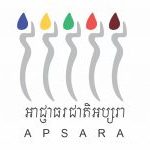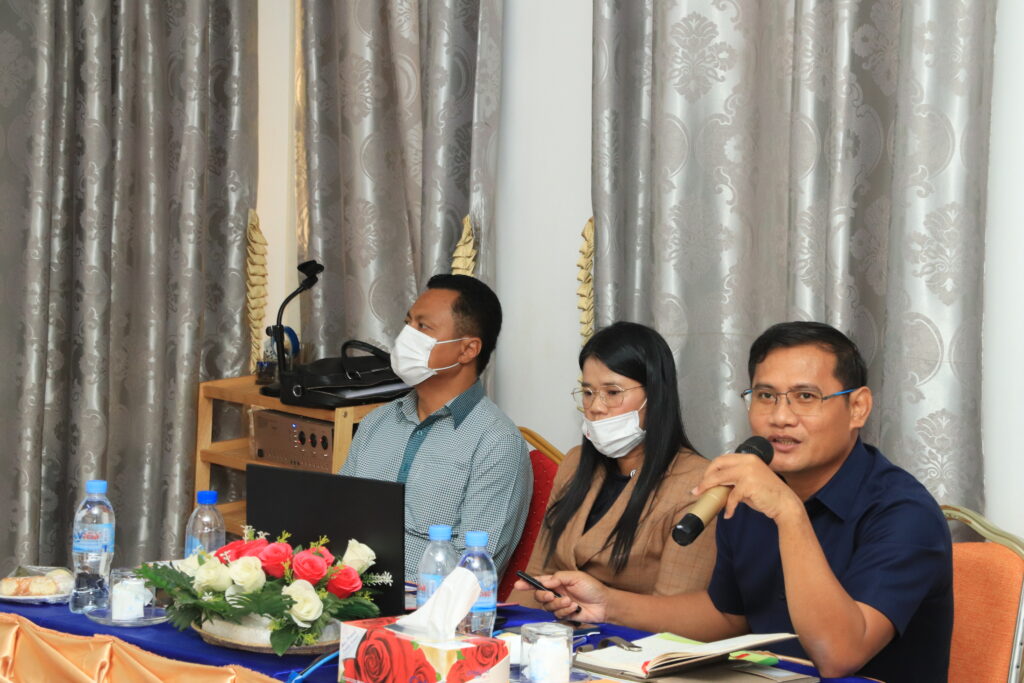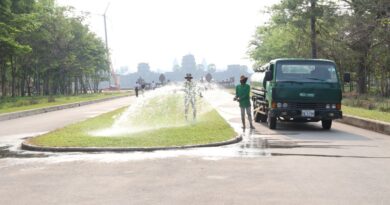អាជ្ញាធរជាតិអប្សរា នៅថ្ងៃទី១ ខែសីហា ឆ្នាំ២០២២ បានរៀបចំសិក្ខាសាលាស្ដីពី ការគ្រប់គ្រងដីធ្លីនៅតំបន់១ និងតំបន់២ ក្នុងតំបន់រមណីយដ្ឋានអង្គរ ដែលធ្វើឡើងនៅមជ្ឈមណ្ឌលបណ្ដុះបណ្ដាលអង្គរ នៃអាជ្ញាធរជាតិអប្សរា។ សិក្ខាសាលានេះ មានការចូលរួមពីជាវាគ្មិនដោយលោកជំទាវ ជា សុកនួន និងឯកឧត្តម ស៊ន់ សុជាតិ ទីប្រឹក្សាក្រសួងវប្បធម៌ និងវិចិត្រសិល្បៈ និងជាមេធាវីរបស់អាជ្ញាធរជាតិអប្សរា។
សិក្ខាសាលានេះ ធ្វើឡើងក្នុងបំណងពង្រឹងសមត្ថភាព និងផ្តល់ចំណេះដឹងបន្ថែម ដល់មន្រ្តី បុគ្គលិក នៃនាយកដ្ឋានរៀបចំដែនដី និងគ្រប់គ្រងលំនៅដ្ឋានក្នុងឧទ្យានអង្គរ ឱ្យបានជ្រាបកាន់តែច្បាស់លើចំណេះដឹងផ្នែកច្បាប់ និងនីតិវិធីក្នុងការចុះសម្របសម្រួលការងារបានកាន់តែប្រសើរ ស្របតាមទិសដៅរបស់អាជ្ញាធរជាតិអប្សរា ក្នុងការរៀបចំ គ្រប់គ្រង និងអភិវឌ្ឍន៍រមណីយដ្ឋានអង្គរប្រកបដោយចីរភាព។ សិក្ខាសាលានេះ មានអ្នកចូលរួមប្រមាណ៦០នាក់។
មេធាវីអាជ្ញាធរជាតិអប្សរា លោកជំទាវ ជា សុកនួន បានចាប់ផ្តើមលើកឡើងពីច្បាប់ និងលិខិតគតិយុត្តមួយចំនួនក្នុងការងារគ្រប់គ្រងដីតំបន់១ និងតំបន់២ ដែលជាដីទ្រព្យសម្បត្តិសាធារណរបស់រដ្ឋ គ្រប់គ្រងដោយអាជ្ញាធរជាតិអប្សរា ក្នុងការគ្រប់គ្រង ថែរក្សា និងអភិវឌ្ឍន៍ប្រកដោយចីរភាព។ ដូច្នេះដើម្បីអនុវត្តន៍តាមលក្ខខណ្ឌក្នុងការចុះបញ្ជីបញ្ចូលរមណីយដ្ឋានអង្គរក្នុងបញ្ជីបេតិកភណ្ឌពិភពលោករបស់អង្គការយូណេស្កូ រាជរដ្ឋាភិបាលកម្ពុជាបានបង្កើតច្បាប់ បទបញ្ជា និងបទដ្ឋានគតិយុត្តនានាជាបន្តបន្ទាប់ ដើម្បីកំណត់ និងចាត់ចែងគ្រប់គ្រងតំបន់រមណីយដ្ឋានអង្គរ។
ក្នុងបទបង្ហាញរបស់លោកជំទាវ ជា សុកនួន តំបន់សៀមរាប អង្គរ ត្រូវបានកំណត់ជាតំបន់រមណីយដ្ឋានវប្បធម៌ត្រូវការពារ និងត្រូវបានធ្វើចំណាត់ថ្នាក់ជា៥ប្រភេទ ដែលមានតំបន់១ រហូតដល់តំបន់៥។ លោកជំទាវបន្ថែមថា ដីតំបន់១ និងតំបន់២ មានចំណុចពិសេស និងសំខាន់ជាងគេ ដ្បិតជាតំបន់ស្នូលប្រាសាទ និងបុរាណវិទ្យា។ ការអភិវឌ្ឍនានាត្រូវបានហាមឃាត់ លើកលែងតែការអភិវឌ្ឍណាដែលមានសារប្រយោជន៍សម្រាប់ការពារ និងលើកស្ទួយតម្លៃនៃរមណីយដ្ឋាន ស្ថានីយបុរាណវត្ថុ ឬសម្រាប់ថែរក្សារបៀបរស់នៅរបស់មនុស្សនៅតំបន់នោះ។ ក្នុងនោះ ក៏ត្រូវរក្សាទេសភាពវប្បធម៌ ដែលមានតាំងពីដើមមកផងដែរ។ ការសាងសង់ផ្ទះថ្មី ក៏ត្រូវបានហាមឃាត់។ សម្រាប់ពលរដ្ឋរស់នៅយូរលង់មកហើយ ពួកគេទទួលបានសិទ្ធិរស់នៅ ស្នើសុំការជួសជុល តែមិនអាចពង្រីកខ្នងផ្ទះបានឡើយ។
មេធាវី ស៊ន់ សុជាតិ បានលើកឡើងដែរថា ការប្រើប្រាស់ដីធ្លីក្នុងតំបន់១ និងតំបន់២ គឺអនុញ្ញាតឱ្យប្រជាពលរដ្ឋដែលមានលំនៅដ្ឋាន និងរស់នៅយូរលង់មកហើយ អាចបន្តរស់នៅបាន តែពុំមានសិទ្ធិលក់ដូរទេ។ ករណីផ្ទះសម្បែងទ្រុឌទ្រោម អាចស្នើសុំជួសជុល រុះរើ ឬសាងសង់ថ្មីបាន ហើយក៏មានករណីចាំបាច់ដោះស្រាយជីវភាព ពួកគេក៏អាចលក់ដូរឱ្យអ្នកភូមិផងជាមួយគ្នាបានដែរ តែហាមសម្រាប់ការលក់ឱ្យអ្នកចំណូលថ្មី៕
អត្ថបទ៖ នាង សំណាង
រូបភាព៖ ហ៊ុ រិទ្ធី
APSARA National Authority to hold a seminar on land management in Zone 1 and Zone 2 of the Angkor site for its officials and staff
On 01 August 2022, APSARA National Authority organizes a seminar on land management in Zone 1 and Zone 2 of the Angkor site, which be held at the Angkor Training Center of the APSARA National Authority. The seminar is attended by Lok Chumteav Chea Sok Nuon and H.E Mr. Son Socheat, Advisors to the Ministry of Culture and Fine Arts, and lawyers of APSARA National Authority as well as 60 participants.
The purpose of this seminar is to strengthen the capacity and provide additional knowledge to the staff of the Department of Land and Habitat Management in Angkor Park to better understand the legal knowledge and procedures to coordinate better work in line with the direction of the APSARA National Authority for the protection and sustainable development in Angkor site.
APSARA Authority’s lawyer Lok Chumteav Chea Sok Nuon introduces some laws and regulations in the management of land in Zone 1 and Zone 2, which are public property lands of the state managed by the APSARA National Authority. Therefore, to comply with the conditions for the registration of Angkor sites in the UNESCO World Heritage List, the Royal Government of Cambodia has established a series of laws, regulations, and legal norms to define and manage the Angkor site.
In the presentation of Lok Chumteav Chea Sok Nuon, the Siem Reap Angkor area is designated as a protected cultural area and is classified into five categories, ranging from 1 to 5 zones. She added that the land in Zone 1 and Zone 2 has the most special and important points because it is the core area of temples and archeology. Developments are prohibited except for those that are useful for protecting and enhancing the value of the site, archeological site, or for maintaining the livelihood of the people in the area. It is also necessary to preserve the cultural landscape that has existed since the beginning. Construction of new homes is also prohibited. People who have lived on the site for a long time, have been granted the right to live, and ask for repairs, but can not extend the house.
Lawyer Son Socheat also stated that the use of land in Zone 1 and Zone 2 allows people who have lived on the site for a long time to continue living but do not have the right to sell. In the case of dilapidated houses, they can request a repair, dismantling, or new construction, and in case of need to solve their livelihood, they can also sell to the local villagers, but it is forbidden to sell to newcomers.
Article: Neang Samnang
Photos: Hum Rithy





